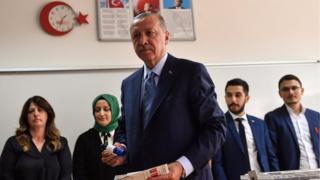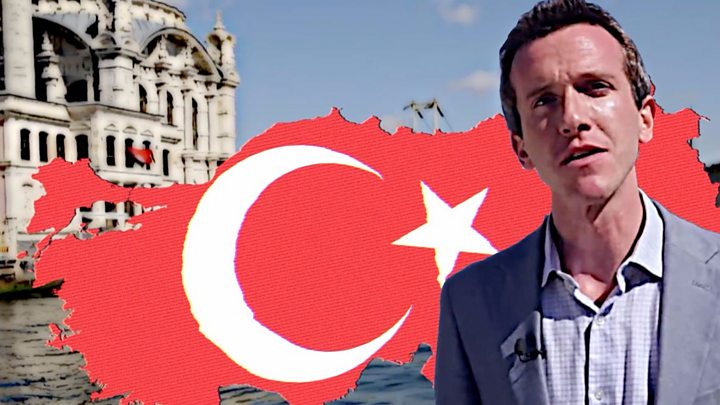 Image copyright
AFP
Image copyright
AFP
Turkey's long-standing leader Recep Tayyip Erdogan is ahead in presidential elections with 62% of votes counted, according to state media.
Mr Erdogan has 56%, and his closest rival, Muharrem Ince, is on 29%.
If Mr Erdogan wins more than 50% of the overall vote, he will be declared the winner and avoid the need for a second round of voting.
As well as the presidency, voters are also choosing members of parliament. Mr Erdogan's party is ahead in that poll.
With 51% of the votes for parliament counted, the president's AK Party leads with 46% of the votes, the state news agency Anadolu reports. The main opposition CHP is on 20%.
Voter turnout is high at almost 87%, the state broadcaster says.
Initial results were thought likely to favour the AK Party, so Mr Erdogan's lead is expected to decrease as more votes are counted.
His opponent accused the state news agency of being manipulative by releasing results from pro-Erdogan areas first.
And, as the BBC's Selin Girit points out, there is a substantial difference between Mr Erdogan's lead as reported by Anadolu and other monitors:
Turkey remains under a state of emergency imposed in the aftermath of a failed coup in July 2016.
These elections were originally scheduled for November 2019 but were brought forward by Mr Erdogan.
He is seeking a second term as president, and would govern under a new constitution which grants the president new powers.
Mr Erdogan was prime minister for 11 years before becoming president in 2014.

Mr Ince has promised to push back what he characterised as a slide into authoritarian rule under Mr Erdogan, should he win.
But his opponent accused the former physics teacher of not having the skills to lead.
Around 60 million Turks were eligible to take part in Sunday's dual polls.
As well as Mr Erdogan and Mr Ince, there are four candidates on the ballot.
One has to hit the 50% threshold in an outright win, or the top two will face off in a second-round vote on 8 July.
What have been the main election issues?
The biggest is the economy. The Turkish lira has tanked and inflation stands at around 11% - so ordinary people are feeling the squeeze.
Terrorism is another vexed issue, as Turkey faces attacks from Kurdish militants and the jihadists of the Islamic State group.

However, correspondents say the country tends to vote along its big divides: one between Kurds and nationalists, and another between religious and secular people.
Is the vote fair?
There was high security at polling stations and ahead of the vote concerns were raised about potential voter intimidation and electoral fraud.
Turkey's election commission has already said it will investigate alleged irregularities in Urfa province, on the southern border with Syria.
Rights activists also say the press is not free to report on all sides.
Under Mr Erdogan's rule, the country has become the world's biggest jailer of journalists, according to monitoring groups.
What effect will the new constitution have?
While the other candidates have rejected the changes, endorsed in endorsed in a tight referendum last year by 51% of voters, Mr Erdogan would start his second term in a turbo-charged version of the job.
The job of prime minister would be scrapped and the president would gain new powers including the ability to directly appoint senior officials.